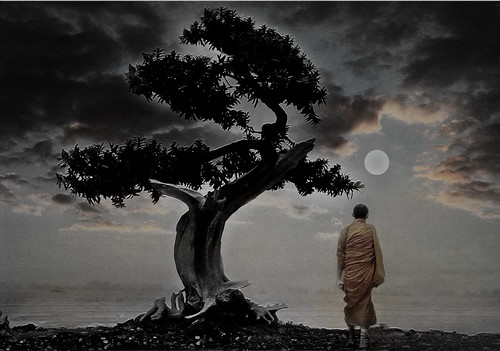 Translated from the Pali by Thanissaro Bhikkhu
Translated from the Pali by Thanissaro Bhikkhu
I have heard that on one occasion the Blessed One was staying at Varanasi in the Game Refuge at Isipatana. There he addressed the group of five monks:
"Form, monks, is not self. If form were the self, this form would not lend itself to dis-ease. It would be possible [to say] with regard to form, 'Let this form be thus. Let this form not be thus.' But precisely because form is not self, form lends itself to dis-ease. And it is not possible [to say] with regard to form, 'Let this form be thus. Let this form not be thus.'
"Feeling is not self...
"Perception is not self...
"[Mental] fabrications are not self...
"Consciousness is not self. If consciousness were the self, this consciousness would not lend itself to dis-ease. It would be possible [to say] with regard to consciousness, 'Let my consciousness be thus. Let my consciousness not be thus.' But precisely because consciousness is not self, consciousness lends itself to dis-ease. And it is not possible [to say] with regard to consciousness, 'Let my consciousness be thus. Let my consciousness not be thus.'
"What do you think, monks — Is form constant or inconstant?"
"Inconstant, lord."
"And is that which is inconstant easeful or stressful?"
"Stressful, lord."
"And is it fitting to regard what is inconstant, stressful, subject to change as: 'This is mine. This is my self. This is what I am'?"
"No, lord."
"...Is feeling constant or inconstant?"
"Inconstant, lord."...
"...Is perception constant or inconstant?"
"Inconstant, lord."...
"...Are fabrications constant or inconstant?"
"Inconstant, lord."...
"What do you think, monks — Is consciousness constant or inconstant?"
"Inconstant, lord."
"And is that which is inconstant easeful or stressful?"
"Stressful, lord."
"And is it fitting to regard what is inconstant, stressful, subject to change as: 'This is mine. This is my self. This is what I am'?"
"No, lord." "Thus, monks, any form whatsoever that is past, future, or present; internal or external; blatant or subtle; common or sublime; far or near: every form is to be seen as it actually is with right discernment as: 'This is not mine. This is not my self. This is not what I am.'
"Thus, monks, any form whatsoever that is past, future, or present; internal or external; blatant or subtle; common or sublime; far or near: every form is to be seen as it actually is with right discernment as: 'This is not mine. This is not my self. This is not what I am.'
"Any feeling whatsoever...
"Any perception whatsoever...
"Any fabrications whatsoever...
"Any consciousness whatsoever that is past, future, or present; internal or external; blatant or subtle; common or sublime; far or near: every consciousness is to be seen as it actually is with right discernment as: 'This is not mine. This is not my self. This is not what I am.'
"Seeing thus, the well-instructed disciple of the noble ones grows disenchanted with form, disenchanted with feeling, disenchanted with perception, disenchanted with fabrications, disenchanted with consciousness. Disenchanted, he becomes dispassionate. Through dispassion, he is fully released. With full release, there is the knowledge, 'Fully released.' He discerns that 'Birth is ended, the holy life fulfilled, the task done. There is nothing further for this world.'"
That is what the Blessed One said. Gratified, the group of five monks delighted at his words. And while this explanation was being given, the hearts of the group of five monks, through not clinging (not being sustained), were fully released from fermentation/effluents.
北傳:雜阿含34經 南傳:相應部22相應59經 /南北傳經文比對 /巴利語經文
雜阿含34經[正聞本146經/佛光本80經](莊春江標點)
如是我聞:
一時,佛住波羅奈國仙人住處鹿野苑中。
爾時,世尊告餘五比丘:
「色非有我,若色有我者,於色不應病苦生,亦不得於色欲令如是,不令如是。以色無我故,於色有病有苦生,亦得於色欲令如是,不令如是。
受……想……行……識亦復如是。
比丘!於意云何?色為是常、為無常耶?」
比丘白佛:「無常,世尊!」
「比丘!若無常者,是苦耶?」
比丘白佛:「是苦,世尊!」
「比丘!若無常、苦,是變易法,多聞聖弟子寧於中見是我,異我,相在不?」
比丘白佛:「不也,世尊!」
「受……想……行……識亦復如是。
是故,比丘!諸所有色,若過去,若未來、若現在,若內、若外,若麤、若細,若好、若醜,若遠、若近,彼一切非我、非我所,如實觀察。
受……想……行……識亦復如是。
比丘!多聞聖弟子於此五受陰,見非我、非我所。如是觀察,於諸世間都無所取;無所取故,無所著;無所著故,自覺涅槃:
『我生已盡,梵行已立,所作已作,自知不受後有。』」
佛說此經已,餘五比丘不起諸漏,心得解脫。
相應部22相應59經/無我相經(莊春江譯)
有一次,世尊住在波羅奈鹿野苑的仙人墬落處。
在那裡,世尊叫[那]群五比丘們:「比丘們!」
「大德!」那些比丘回答世尊。
世尊這麼說:
「比丘們!色無我。因為,比丘們!如果色有我,色不應導致病苦,也應能願色為:
『我的色要這樣;我的色不要這樣。』
但,比丘們!因為色無我,因而色導致病苦,也不能願色為:
『我的色要這樣;我的色不要這樣。』
受無我。因為,比丘們!如果受有我,受不應導致病苦,也應能願受為:
『我的受要這樣;我的受不要這樣。』
但,比丘們!因為受無我,因而受導致病苦,也不能願受為:
『我的受要這樣;我的受不要這樣。』
想無我……(中略)。
行無我。因為,比丘們!如果行有我,行不應導致病苦,也應能願行為:
『我的行要這樣;我的行不要這樣。』
但,比丘們!因為行無我,因而行導致病苦,也不能願行為:
『我的行要這樣;我的行不要這樣。』
識無我。因為,比丘們!如果識有我,識不應導致病苦,也應能願識為:
『我的識要這樣;我的識不要這樣。』
但,比丘們!因為識無我,因而識導致病苦,也不能願識為:
『我的識要這樣;我的識不要這樣。』
比丘們!你們怎麼想:色是常的,還是無常的呢?」
「無常的,大德!」
「而凡為無常的,是苦的,還是樂的呢?」
「苦的,大德!」
「而凡為無常的、苦的、變易法,你適合認為:
『這是我的,我是這個,這是我的真我』嗎?」
「不,大德!」
「受……想……行……識是常的,或是無常的呢?」
「無常的,大德!」
「而凡為無常的,是苦的,或是樂的呢?」
「苦的,大德!」
「而凡為無常的、苦的、變易法,你適合認為:
『這是我的,我是這個,這是我的真我』嗎?」
「不,大德!」
「因此,比丘們!凡任何色,不論過去、未來、現在,或內、或外,或粗、或細,或下劣、或殊勝,或遠、或近,所有色應該以正確之慧這樣如實被看作:
『這不是我的,我不是這個,這不是我的真我。』
凡任何受,不論過去、未來、現在,或內、或外,或粗、或細,或下劣、或殊勝,或遠、或近,所有受應該以正確之慧這樣如實被看作:
『這不是我的,我不是這個,這不是我的真我。』
凡任何想……(中略)。
凡任何行,不論過去、未來、現在,或內、或外,或粗、或細,或下劣、或殊勝,或遠、或近,所有行應該以正確之慧這樣如實被看作:
『這不是我的,我不是這個,這不是我的真我。』
凡任何識,不論過去、未來、現在,或內、或外,或粗、或細,或下劣、或殊勝,或遠、或近,所有識應該以正確之慧這樣如實被看作:
『這不是我的,我不是這個,這不是我的真我。』
比丘們!看到了這樣,已受教導的聖弟子在色上厭,在受上厭,在想上厭,在行上厭,在識上厭。
厭者離染,從離貪而解脫。
當解脫時,有『[這是]解脫』之智,他了知:
『出生已盡,梵行已完成,應該作的已作,不再有這樣[輪迴]的狀態了。』」
這就是世尊所說。
悅意的[那]群五比丘們歡喜世尊所說。
而當說這個開示時,[那]群五比丘們的心由不執取而從諸煩惱解脫。
南北傳經文比對(莊春江作):
1.北傳經文的「如是我聞……歡喜奉行。」的經文格式,參看《雜阿含1經》、《雜阿含30經》「經文比對」。
2.北傳經文的「餘五比丘」,南傳經文作「[那]群五比丘」(pañcavaggiye bhikkhū,直譯為「五群比丘」),菩提比丘長老英譯為「五位成一群的比丘們」(the bhikkus of the group of five)。
3.「病苦」(ābādhāya),菩提比丘長老英譯為「苦惱」(affliction)。
4.北傳經文「亦不得於色欲令如是,不令如是」,南傳經文作「也應能願色為:『我的色要這樣;我的色不要這樣。』」(labbhetha ca rūpe– ‘evaṃ me rūpaṃ hotu, evaṃ me rūpaṃ mā ahosī’ti),菩提比丘長老英譯為「那將可能得其色:『讓我的色是這樣,讓我的色不是這樣。』」(it would be possible to have it of form: ‘Let my form be thus; let my form not be thus’)。此處南北傳經文文義似乎相反,但如果將北傳經文理解成從「他者」的角度來看,將南傳經文理解成「『我』自身」的度來看,則含意是一樣的。
5.「已受教導的聖弟子」(sutavā ariyasāvako,另譯為「多聞聖弟子」),菩提比丘長老英譯為「已受教導的崇高弟子」(the instructed noble disciple)。「聖弟子」參看《雜阿含1經》「經文比對」。
6.「變易法」,參看《雜阿含36經》「經文比對」。
7.北傳經文的「是我,異我,相在」,參看《雜阿含23經》「經文比對」。
8.「五受陰」,參看《雜阿含13經》及其「經文比對」。
9.北傳經文的「不起諸漏,心得解脫」,南傳經文作「心由不執取而從諸煩惱解脫」(anupādāya āsavehi cittāni vimucciṃsūti),菩提比丘長老英譯為「心以不執著而從污點自由了」(the mind ……were liberated from the taints by nonclinging)。「煩惱」,另譯為「漏」,參看《雜阿含55經》「經文比對」。
10.北傳經文的「如實觀察」,南傳經文作「以正確之慧這樣如實被看作」,參看《雜阿含2經》、《雜阿含24經》「經文比對」。
11.北傳經文的「無所著故,自覺涅槃」,參看《雜阿含39經》「經文比對」。
12.北傳經文的「我生已盡……」,參看《雜阿含9經》「經文比對」。
13.南傳經文的「厭,離染,離貪,解脫」,參看《雜阿含1經》「經文比對」。
14.南傳經文「悅意的[那]群五比丘們」的「悅意的」(attamana,另譯為「適意的;滿意的」),菩提比丘長老英譯為「得意洋洋的;興高采烈的」(elated)或「滿意與喜悅」(was satisfied and delighted)。
15.南傳經文「而當說這個開示時」的「說」(bhaññamāne),經文使用現在分詞,表示是在「說法正在進行當中」。
16.南傳經文經名「無我相經」(anattalakkhaṇasuttaṃ),菩提比丘長老英譯為「無自我特徵」(The Characteristic of Nonself)。
17.南傳經文的「大德」,參看《雜阿含15經》「經文比對」。
18.另參看《雜阿含86經》、《雜阿含87經》《雜阿含33經》、《雜阿含316經》、《雜阿含317經》、《雜阿含318經》、。
巴利語經文(台灣嘉義法雨道場流通的word版本)
SN.22.59 (7). Anattalakkhaṇasuttaṃ
59. Ekaṃ samayaṃ bhagavā bārāṇasiyaṃ viharati isipatane migadāye. Tatra kho bhagavā pañcavaggiye bhikkhū āmantesi– “bhikkhavo”ti. “Bhadante”ti te bhikkhū bhagavato paccassosuṃ. Bhagavā etadavoca–
“Rūpaṃ, bhikkhave, anattā. Rūpañca hidaṃ, bhikkhave, attā abhavissa, nayidaṃ rūpaṃ ābādhāya saṃvatteyya, labbhetha ca rūpe– ‘evaṃ me rūpaṃ hotu, evaṃ me rūpaṃ mā ahosī’ti. Yasmā ca kho, bhikkhave, rūpaṃ anattā, tasmā rūpaṃ ābādhāya saṃvattati, na ca labbhati rūpe– ‘evaṃ me rūpaṃ hotu, evaṃ me rūpaṃ mā ahosī’”ti.
“Vedanā anattā. Vedanā ca hidaṃ, bhikkhave, attā abhavissa, nayidaṃ vedanā ābādhāya saṃvatteyya, labbhetha ca vedanāya– ‘evaṃ me vedanā hotu, evaṃ me vedanā mā ahosī’ti. Yasmā ca kho, bhikkhave, vedanā anattā, tasmā vedanā ābādhāya saṃvattati na ca labbhati vedanāya– ‘evaṃ me vedanā hotu, evaṃ me vedanā mā ahosī’”ti.
“Saññā anattā …pe… saṅkhārā anattā. Saṅkhārā ca hidaṃ, bhikkhave, attā abhavissaṃsu, nayidaṃ saṅkhārā ābādhāya saṃvatteyyuṃ, labbhetha ca saṅkhāresu– ‘evaṃ me saṅkhārā hontu, evaṃ me saṅkhārā mā ahesun’ti. Yasmā ca kho, bhikkhave, saṅkhārā anattā, tasmā saṅkhārā ābādhāya saṃvattanti, na ca labbhati saṅkhāresu– ‘evaṃ me saṅkhārā hontu, evaṃ me saṅkhārā mā ahesun’”ti.
“Viññāṇaṃ anattā. Viññāṇañca hidaṃ, bhikkhave, attā abhavissa, nayidaṃ viññāṇaṃ ābādhāya saṃvatteyya, labbhetha ca viññāṇe– ‘evaṃ me viññāṇaṃ hotu, evaṃ me viññāṇaṃ mā ahosī’ti. Yasmā ca kho, bhikkhave, viññāṇaṃ anattā, tasmā viññāṇaṃ ābādhāya saṃvattati, na ca labbhati viññāṇe– ‘evaṃ me viññāṇaṃ hotu, evaṃ me viññāṇaṃ mā ahosī’”ti.
“Taṃ kiṃ maññatha, bhikkhave, rūpaṃ niccaṃ vā aniccaṃ vā”ti? “Aniccaṃ, bhante”. “Yaṃ panāniccaṃ dukkhaṃ vā taṃ sukhaṃ vā”ti? “Dukkhaṃ, bhante”. “Yaṃ panāniccaṃ dukkhaṃ vipariṇāmadhammaṃ, kallaṃ nu taṃ samanupassituṃ– ‘etaṃ mama, esohamasmi, eso me attā’”ti? “No hetaṃ, bhante”. “Vedanā… saññā… saṅkhārā… viññāṇaṃ niccaṃ vā aniccaṃ vā”ti? “Aniccaṃ, bhante”. “Yaṃ panāniccaṃ dukkhaṃ vā taṃ sukhaṃ vā”ti? “Dukkhaṃ bhante”. “Yaṃ panāniccaṃ dukkhaṃ vipariṇāmadhammaṃ, kallaṃ nu taṃ samanupassituṃ– ‘etaṃ mama, esohamasmi, eso me attā’”ti? “No hetaṃ, bhante”.
“Tasmātiha, bhikkhave, yaṃ kiñci rūpaṃ atītānāgatapaccuppannaṃ ajjhattaṃ vā bahiddhā vā oḷārikaṃ vā sukhumaṃ vā hīnaṃ vā paṇītaṃ vā yaṃ dūre santike vā, sabbaṃ rūpaṃ– ‘netaṃ mama, nesohamasmi, na meso attā’ti evametaṃ yathābhūtaṃ sammappaññāya daṭṭhabbaṃ. Yā kāci vedanā atītānāgatapaccuppannā ajjhattā vā bahiddhā vā …pe… yā dūre santike vā, sabbā vedanā– ‘netaṃ mama, nesohamasmi, na meso attā’ti evametaṃ yathābhūtaṃ sammappaññāya daṭṭhabbaṃ.
“Yā kāci saññā …pe… ye keci saṅkhārā atītānāgatapaccuppannā ajjhattaṃ vā bahiddhā vā …pe… ye dūre santike vā, sabbe saṅkhārā– ‘netaṃ mama, nesohamasmi, na meso attā’ti evametaṃ yathābhūtaṃ sammappaññāya daṭṭhabbaṃ.
“Yaṃ kiñci viññāṇaṃ atītānāgatapaccuppannaṃ ajjhattaṃ vā bahiddhā vā oḷārikaṃ vā sukhumaṃ vā hīnaṃ vā paṇītaṃ vā yaṃ dūre santike vā, sabbaṃ viññāṇaṃ– ‘netaṃ mama, nesohamasmi, na meso attā’ti evametaṃ yathābhūtaṃ sammappaññāya daṭṭhabbaṃ.
“Evaṃ passaṃ, bhikkhave, sutavā ariyasāvako rūpasmimpi nibbindati, vedanāyapi nibbindati, saññāyapi nibbindati, saṅkhāresupi nibbindati, viññāṇasmimpi nibbindati. Nibbindaṃ virajjati; virāgā vimuccati. Vimuttasmiṃ vimuttamiti ñāṇaṃ hoti. ‘Khīṇā jāti, vusitaṃ brahmacariyaṃ, kataṃ karaṇīyaṃ, nāparaṃ itthattāyā’ti pajānātī”ti.
Idamavoca bhagavā. Attamanā pañcavaggiyā bhikkhū bhagavato bhāsitaṃ abhinanduṃ .
Imasmiñca pana veyyākaraṇasmiṃ bhaññamāne pañcavaggiyānaṃ bhikkhūnaṃ anupādāya āsavehi cittāni vimucciṃsūti. Sattamaṃ.
--------------------------------------
Technorati: Buddhism Buddha Buddhist Dharma Compassion Wisdom Religion Meditation 無我相經 Thanissaro Bhikkhu Spirituality Inspiration Not Self Anatta
“Sariputra, if there are people who have already made the vow, who now make the vow, or who are about to make the vow, ‘I desire to be born in Amitabha’s country,’ these people, whether born in the past, now being born, or to be born in the future, all will irreversibly attain to anuttarasamyaksambodhi. Therefore, Sariputra, all good men and good women, if they are among those who have faith, should make the vow, ‘I will be born in that country.’”
~ Amitabha Sutra
When I obtain the Buddhahood, any being of the boundless and inconceivable Buddha-worlds of the ten quarters whose body if be touched by the rays of my splendour should not make his body and mind gentle and peaceful, in such a state that he is far more sublime than the gods and men, then may I not attain the enlightenment.
~ Amitabha Buddha's Thirty-Third Vow
Saturday, February 28, 2009
Anatta-lakkhana Sutta: The Discourse on the Not-self Characteristic
Posted by
Colin
at
2/28/2009 12:18:00 AM
![]()
Labels: Anatta, Anatta-lakkhana Sutta, Thanissaro Bhikkhu, The Discourse on the Not-self Characteristic, 無我相經
Subscribe to:
Post Comments (Atom)



Please give an indication to which pitaka the anatta lankkhana sutta belongs + the number
ReplyDelete